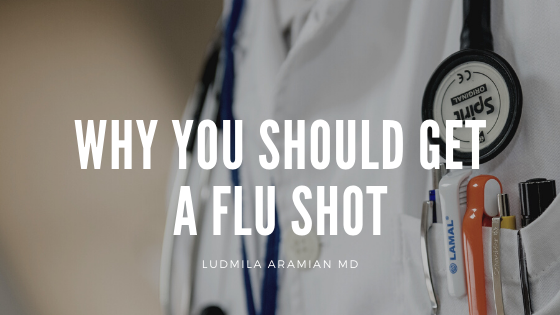Every year when flu season rolls around, millions of people end up being infected. Influenza can be serious and potentially even fatal. The Centers for Disease Control and Prevention estimates that “hundreds of thousands of people are hospitalized and thousands or tens of thousands of people die from flu-related causes every year.” Influenza can affect people in a variety of ways, and not everyone experiences it the same. According to the CDC, the best means of prevention is to get an annual flu vaccination. While getting your flu shot is not a guarantee that you won’t contract an influenza virus, it can mitigate the severity of symptoms if you do end up catching the flu. The influenza virus evolves from year to year, which is why new vaccines are released each year, to ensure the latest strains of the virus are being targeted. It is also why it is vital to get a flu shot annually.
Receiving your flu shot may not only prevent you from catching the flu, but it can help increase herd immunity. Herd immunity occurs when enough of the population receives the vaccination to lower the risk of catching the flu for those who haven’t received the vaccination.
Who Should Get a Flu Shot
Generally speaking, the CDC recommends that everyone age six months and older receive the vaccination annually. However, there are specific populations that are more strongly encouraged to receive their annual flu shot than others due to the potential complications that come with influenza. These populations include pregnant women, older adults, and young children and those with chronic medical conditions that may leave them more vulnerable.
A tiny percentage of individuals are not advised to receive the annual vaccination. Those with egg allergies should consult with their physician before receiving a flu shot. Anyone who’s had a severe reaction to a previous flu shot should also consult their doctor.
When Should You Receive Your Shot
Because it can take two weeks for your body to develop antibodies to protect against the virus, it’s best to get your shot before it begins spreading in your community. Though there’s not a way to predict exactly when flu season will strike, it is generally between October and May with peaks between December and February. The CDC recommends that you receive your shot before the end of October, but you can be vaccinated as soon as flu shots become available.
When it comes to vaccinating children between the ages of six months and eight years, some may require two separate doses of the vaccine. These doses should be given four weeks apart to gain full protection. To ensure the best possible protection, be sure to consult your family pediatrician.
Common Myth Debunked
There is one myth surrounding flu shots that has prevented people from being vaccinated over the years. The myth that getting the flu shot can give you the flu is inaccurate. Some people believe the myth because you can experience flu-like symptoms after receiving the shot. This can happen for several reasons.
One reason is that some people may experience a reaction to the vaccine in which they develop a fever and muscle aches as their body begins producing the protective antibodies. Another reason could be that it takes two weeks for the vaccination to be fully effective. This provides a brief window in which a person could be exposed to the flu virus and end up with the flu. A third possibility is that the strains of influenza contained in the flu shot are not the same as those circulating in a particular season. And some people become sick with other illnesses that mimic flu-like symptoms and assume they have contracted the flu. If you want to avoid catching the flu this flu season, it is best to make sure you get your flu shot. While it doesn’t guarantee you won’t get sick, it’s the best means of prevention for the flu virus.
dy begins producing the protective antibodies. Another reason could be that it takes two weeks for the vaccination to be fully effective. This provides a brief window in which a person could be exposed to the flu virus and end up with the flu. A third possibility is that the strains of influenza contained in the flu shot are not the same as those circulating in a particular season. And some people become sick with other illnesses that mimic flu-like symptoms and assume they have contracted the flu.
If you want to avoid catching the flu this flu season, it is best to make sure you get your flu shot. While it doesn’t guarantee you won’t get sick, it’s the best means of prevention for the flu virus.

